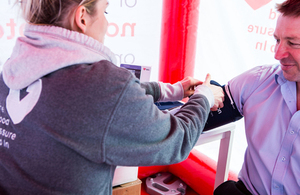PHE calls for greater high blood pressure awareness
As many as 5.5 million adults in England with undiagnosed high blood pressure are risking heart attack, stroke or even vascular dementia.

With only half the adult population knowing their blood pressure, Public Health England (PHE) is encouraging all adults over the age of 40 to get it tested as part of the NHS Health Check, a simple measure that could save their life. If found to be at risk, high blood pressure can be managed and reduced by making simple lifestyle changes.
PHE’s latest edition of Health matters – a resource for local authorities and health professionals – which has been launched today (24 January 2017) outlines the actions that can be taken to combat high blood pressure.
Often dubbed the ‘silent killer’, as it rarely causes symptoms, high blood pressure affects more than 1 in 4 people in England and was responsible for around 75,000 deaths in 2015.
Evidence summarised in Health matters shows:
- the NHS Health Check helps diagnose a new case of high blood pressure in every 27 checks
- despite being largely preventable, diseases caused by high blood pressure cost the NHS over £2.1 billion a year
- if the population as a whole reduced their average blood pressure by 5mmHg this could save the NHS, social care, and local authorities £850 million on health and social care costs
- £120 million in savings could also be achieved just by increasing the number of adults who have high blood pressure diagnosed by 15%
- over 10 million people, aged 40 to 74, have been invited for an NHS Health Check since it launched in 2013 but just under half (46%) actually took the offer up
Professor Kevin Fenton, Director of Health and Wellbeing at PHE, said:
It is a serious problem when a disease that is largely preventable, like high blood pressure, is one of the leading causes of premature death and ill-health in the country.
We all memorise important numbers in our lives, whether it’s our PIN and telephone numbers or the latest football scores. Knowing your blood pressure number is an easy step to take that has the potential to save your life.
GP Dr Matt Kearney, NHS England’s National Clinical Director for Cardiovascular Disease Prevention, said:
High blood pressure is currently placing an unnecessary, heavy burden on the NHS. Earlier detection and improved treatment of high blood pressure would have a big impact in preventing heart attacks and strokes, and would save large amounts of money in health and social care.
Catherine Kelly, British Heart Foundation (BHF) Director of Prevention, Survival and Support, said:
5.5 million people in the UK are living with undiagnosed high blood pressure which puts them at a much higher risk of suffering a potentially deadly heart attack or stroke. For a condition which is so easily detected and managed, this figure is simply unacceptable and we need an urgent improvement in the number of people diagnosed with this silent killer.
As well as funding £25 million of research into high blood pressure over the past 5 years, the BHF is also working alongside partners on a range of innovative projects which enable individuals and health care professionals to better prevent, diagnose and treat high blood pressure.
High blood pressure, and its effects such as heart disease, stroke and vascular dementia, can be improved or prevented by making simple lifestyle changes. These include maintaining a healthy weight, having an active lifestyle, reducing your salt, saturated fat and alcohol intake, and knowing your blood pressure numbers.
PHE has a number of tools to help people lead a healthier lifestyle such as the new free Be Food Smart app by Change4Life. This shows how much salt, saturated fat and sugar is in the food and drink they consume, making it easier to choose low salt and saturated fat options.
PHE’s One You quiz is an easy way to assess your current lifestyle, including diet, physical activity, smoking, and alcohol consumption, and receive free personalised information, apps and tools to help prevent or improve high blood pressure and achieve a healthier you.
People over the age of 30 years old are also encouraged to access the NHS Choices and BHF heart age tool, which will provide users with a heart age plus advice about improving your heart health.